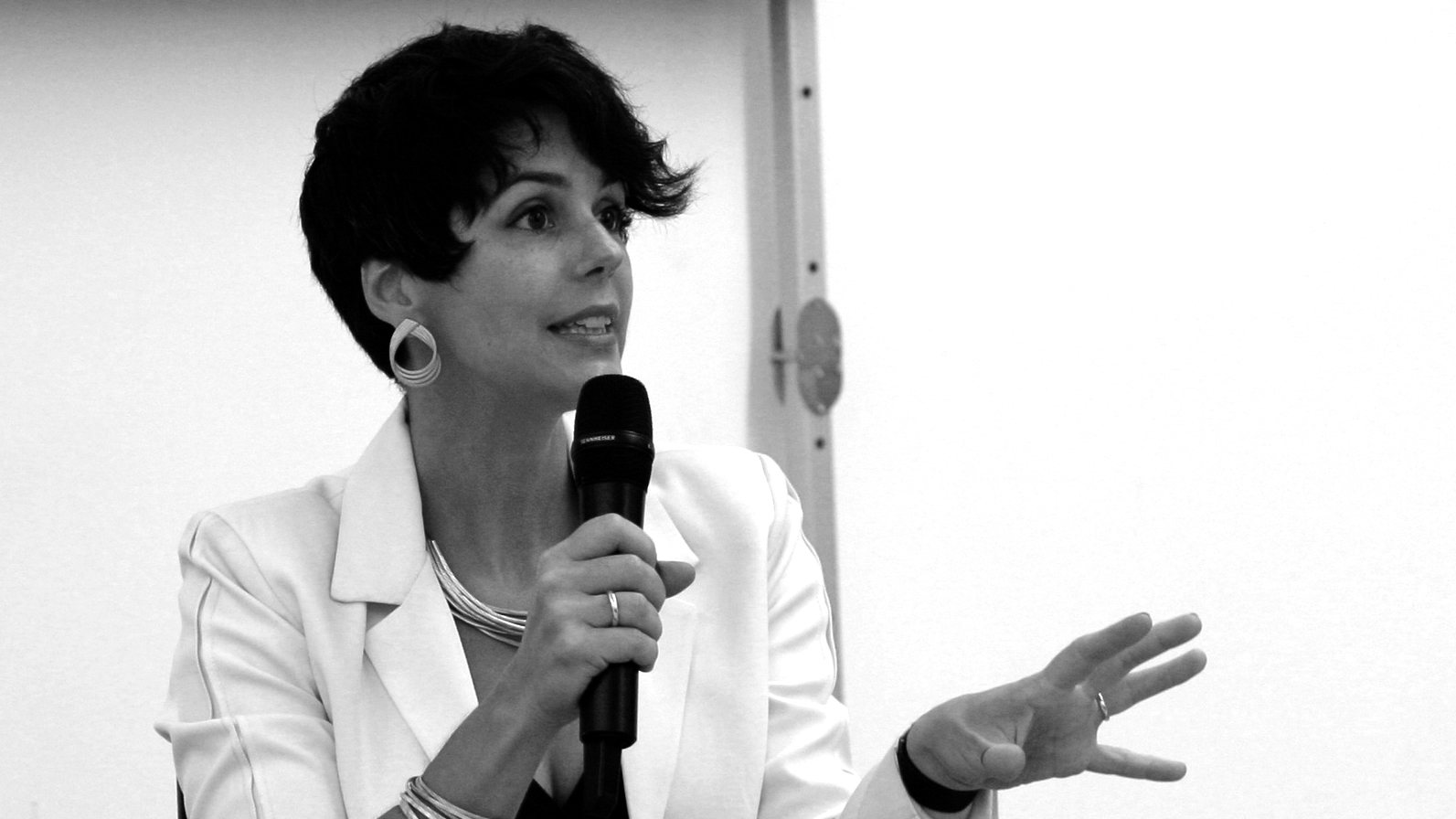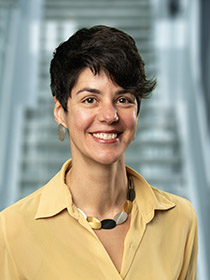M. Czaika: Welcome! We are very pleased that you have taken over the newly created professorship for Migration and Integration at the Department of Migration and Globalisation. Your areas of interest fit perfectly into the ongoing research activities of our department.
J. Mourão Permoser: I am also very happy to become part of this strong team. Also, because it is an interdisciplinary department and thus fits my own approach to migration research. You can't understand a topic like migration from just one angle because it is so complex. Only when you think about legal, historical, political and social aspects together can you grasp the phenomenon. It is also important to bring together the strengths of normative and empirically oriented research approaches.
However, inter- or transdisciplinarity can only be realized to its full extent if the appropriate institutional anchoring for it is there. While individuals can (and should) conduct interdisciplinary research and draw on theories and methods from different disciplines, this is often not enough. Interdisciplinary research into such a complex topic as migration requires departments like the one here in Krems, which bring together experts from different fields and thus enable cooperation across disciplinary boundaries.

Could you give us an overview of your research interests, in particular the research program you co-founded called "Ethics of Migration Policy Dilemmas"?
I am currently looking at the phenomenon of migration and integration from two perspectives that are quite complementary. One is about exploring political and social conflicts over migration and integration as a form of morality politics. I am interested in conflicts of values over migration and in the types of political action that emerge in the context of such disputes. In particular, I am interested in civil society actors, such as NGOs, social movements, or religious institutions, and in forms of policymaking beyond classical electoral politics (see also an ongoing research project entitled "Migration as Morality Politics").
The second research focus is on ethical dilemmas in the context of regulating migration or the integration process. People who are actively involved here – whether as policymakers or as representatives of a civil society organization – are repeatedly in the situation of having to decide between courses of action, each of which is problematic for different reasons. So, I am concerned with the question: What normative dilemmas do people in this field face? How do they deal with them? And what analyses and solutions can we as researchers offer that can minimize the dilemma, or at least make it somewhat easier to cope with? There is a great need for research here. So far, only a few initiatives have been launched in migration research that bring together normatively oriented and empirical or application-oriented approaches.
I can give an example for moral dilemmas in this area from my research on sea rescue of refugees. Many people try to reach the southern borders of Europe via the Mediterranean Sea, especially from the northern coasts of Africa, and end up in distress at sea. In a recent article co-authored with Itamar Mann, we shed light on the problems that the sea rescuers, the NGOs that are active in the Mediterranean, are confronted with, and how they deal with them. Based on qualitative in-depth interviews with rescuer, we concluded that they face primarily two dilemmas: One we know from the political and media debate: in certain situations, sea rescuers fear that their rescue trips will inadvertently contribute to the business model of the smugglers, who make a business out of bringing people across the Mediterranean in cheap, unseaworthy boats with too little fuel. Many sea rescuers do not want to support these smuggling businesses but see it as an ethical duty to save people from dying. If they do not, they violate their principles. If they do, they may also be acting against their principles if traffickers profit indirectly from their actions.
But this is only one side of the coin. Another dilemma they face is how to cooperate with government authorities. In order to be able to operate on the ground, they have to follow various regulations set by the EU states. This means that if they want to act as rescuers, they have to cooperate. In certain circumstances, such cooperation can also mean turning a blind eye to abusive practices of state actors, for example if NGOs witness a coast guard of a European state engaging in an illegal pushback or using violence against refugees.
In other cases, members of search and rescue NGOs might even have to become themselves indirectly involved in such abuses in order to be able to operate in the Mediterranean. Consider the fact that, many times, when they are informed of a case of distress at sea, European countries do not directly rescue people, but instead inform the Libyan coast guard, who is supposed to push people back to Libya. European states do so in order to circumvent their duty to duly assess the asylum applications of those rescued.If, in order to be able to rescue, the sea rescuers are obliged to report every case of distress at sea to the coast guard of the respective European state, knowing that this message will immediately be passed on to the Libyan coast guard, they get into the dilemmatic situation. The know that the Libyan coast guard will take the people back to Libya, which, given Libya’s record of massive and systematic violations of the human rights of asylum seekers, effectively means back into a situation where torture, inhumane treatment and danger to life are imminent. So, the rescuers are faced with the following dilemmatic question: either I accept to be involved in something I deeply disagree with (like pushbacks) or I don't cooperate and then I can no longer be active in sea rescue.
These are examples of ethical dilemmas that social research can uncover and analyze – in order to provide information, but also to create a better basis for decision-making when weighing up options for action. This is what our program "Ethics of Migration Policy Dilemmas" is about, which I coordinate together with Rainer Bauböck (Head of the Commission for Migration and Integration Research at the Austrian Academy of Sciences), Martin Ruhs (EUI) and Lukas Schmid (Center for Normative Orders in Frankfurt). We invite scholars to write about specific dilemmas in the field of migration and flight and how to deal with them and publish them in the form of special issues and thematic clusters in important journals such as Migration Studies and Comparative Migration Studies. ). For each of these articles, a virtual symposium is organized on the “Dilemma website”. For each kickoff contribution, we invite four to six scholars from different disciplines and actors from the field to write a critical response, taking issue with some aspect of the argument made by the authors of the original contribution. The debate is then concluded with a rejoinder by the authors of the kickoff contribution. All contributions are available free of charge on the project website. Our aim is to promote an interdisciplinary dialog between normatively oriented and empirically working researchers, as well as to improve the exchange between the scientific community and political decision-makers and practitioners .
You yourself have traveled a fascinating path that has been diverse – both geographically and in terms of your academic projects. How did you come to choose to do research in the field of migration?
I grew up in Brazil and then went to the U.S. to study International Relations, with the goal of returning afterwards to work as a diplomat in the Brazilian Foreign Ministry. I wrote my master thesis on participatory budgeting in Brazil – from those early days, I was interested in the topic of social inclusion. This is perhaps due to the fact that Brazil is a deeply divided country, firstly because of the huge income gap between the small but powerful elite and the vast majority of Brazilians. Second, the inequality in Brazil today cannot be separated from the colonial legacy and from the history of slavery, as well as to the genocide of the indigenous population of Brazil. This means that inequality in Brazil is first and foremost a form of economic inequality, which is fundamentally linked to structural racism. Participatory democracy, for example in the area of budget development, is a useful approach to promote the social inclusion of underrepresented groups.
Once I arrived in Europe, I continued to be guided by an interest in democratic politics and the possibilities of implementing innovative forms of policy-making that would be able to overcome some of the structural biases present in nation-states and in our classic ways of doing politics. Since I was in Europe, I became increasingly fascinated by the European Union, understood as an experiment in democratic politics beyond the state. So, from the 2000s onwards, I mainly researched policymaking at supranational level, at the time of my master thesis focusing on the question of whether there was something like a "democratic deficit" in the EU and, if so, how it could be addressed.
Then, as part of my doctoral research, I started focusing on migration. Be then, it had become apparent to me that the processes of social inclusion and exclusion that I was interested in took a particular form in the European context which was closely connected to the issue of migration. Or, put differently, that it was in the migration field that the question of ethnic, economic and democratic inclusion was being fought in the most virulent and pressing way. So, for me, the issue of migration became a way to study the challenges to democracy posed by multiple and overlapping inequalities, as well as the dangers currently facing pluralism in diverse societies. How to promote social inclusion and democratic equality across ethnic, economic and cultural divides – this question continues to drive me. Ever since I've been living in Europe, I've been dealing with it from the perspective of migration studies, because that's one of the fields where it's most explosive. And the fact that I am a migrant myself has certainly also contributed to my interest in this field.
Biographical:
Since 1 September 2023, Julia Mourão Permoser is Professor of Migration and Integration at the Deparment for Migration and Globalisation of the Danube University Krems. Her previous positions include Visiting Professor of Political Science at the University of Vienna, Senior Research Fellow at the Department of Political Science at the University of Innsbruck, and Research Fellow at the Institute for European Studies of the Université Libre de Bruxelles. She holds a bachelor's degree from Georgetown University, a master's degree from the Diplomatic Academy of Vienna, and a doctorate in political science from the University of Vienna.
Prof. Permoser has published extensively on issues related to migration policy and politics, as well as on migration integration and social cohesion. Between 2010 and 2023, she has acquired 5 project grants as principal investigator. Currently, she is the principal investigator of a research project financed by the Austrian Science Fund (FWF) entitled "Migration as Morality Politics" and co-principle investigator of the project "Ethical Dilemmas of Migration Policy", located at the European University Institute in Florence. More information about her research and activities can be found here: www.mourao-permoser.com
